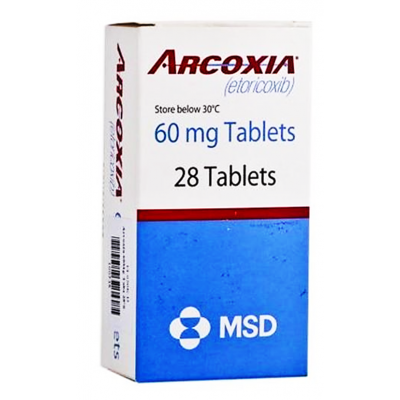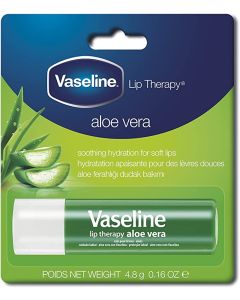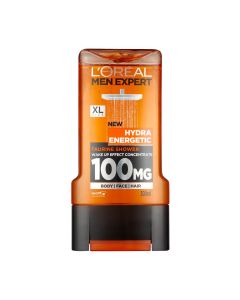Active ingredient etoricoxib Therapeutic indications ARCOXIA is indicated in adults and adolescents 16 years of age and older for the symptomatic relief of osteoarthritis (OA), rheumatoid arthritis (RA), ankylosing spondylitis, and the pain and signs of inflammation associated with acute gouty arthritis. ARCOXIA is indicated in adults and adolescents 16 years of age and older for the short-term treatment of moderate pain associated with dental surgery. The decision to prescribe a selective COX-2 inhibitor should be based on an assessment of the individual patient's overall risks (see sections 4.3 and 4.4). 4.2 Posology and method of administration Posology As the cardiovascular risks of etoricoxib may increase with dose and duration of exposure, the shortest duration possible and the lowest effective daily dose should be used. The patient's need for symptomatic relief and response to therapy should be re-evaluated periodically, especially in patients with osteoarthritis (see sections 4.3, 4.4, 4.8 and 5.1). Osteoarthritis The recommended dose is 30 mg once daily. In some patients with insufficient relief from symptoms, an increased dose of 60 mg once daily may increase efficacy. In the absence of an increase in therapeutic benefit, other therapeutic options should be considered. Rheumatoid arthritis The recommended dose is 60 mg once daily. In some patients with insufficient relief from symptoms, an increased dose of 90 mg once daily may increase efficacy. Once the patient is clinically stabilised, down-titration to a 60 mg once daily dose may be appropriate. In the absence of an increase in therapeutic benefit, other therapeutic options should be considered. Ankylosing spondylitis The recommended dose is 60 mg once daily. In some patients with insufficient relief from symptoms, an increased dose of 90 mg once daily may increase efficacy. Once the patient is clinically stabilised, down-titration to a 60 mg once daily dose may be appropriate. In the absence of an increase in therapeutic benefit, other therapeutic options should be considered. Acute pain conditions For acute pain conditions, etoricoxib should be used only for the acute symptomatic period. Acute gouty arthritis The recommended dose is 120 mg once daily. In clinical trials for acute gouty arthritis, etoricoxib was given for 8 days. Postoperative dental surgery pain The recommended dose is 90 mg once daily, limited to a maximum of 3 days. Some patients may require other postoperative analgesia in addition to ARCOXIA during the three-day treatment period. Doses greater than those recommended for each indication have either not demonstrated additional efficacy or have not been studied. Therefore: The dose for OA should not exceed 60 mg daily. The dose for RA and ankylosing spondylitis should not exceed 90 mg daily. The dose for acute gout should not exceed 120 mg daily, limited to a maximum of 8 days treatment. The dose for postoperative acute dental surgery pain should not exceed 90 mg daily, limited to a maximum of 3 days. Special populations Elderly patients No dosage adjustment is necessary for elderly patients. As with other drugs, caution should be exercised in elderly patients (see section 4.4). Patients with hepatic impairment Regardless of indication, in patients with mild hepatic dysfunction (Child-Pugh score 5-6) a dose of 60 mg once daily should not be exceeded. In patients with moderate hepatic dysfunction (Child-Pugh score 7-9), regardless of indication, the dose of 30 mg once daily should not be exceeded. Clinical experience is limited particularly in patients with moderate hepatic dysfunction and caution is advised. There is no clinical experience in patients with severe hepatic dysfunction (Child-Pugh score ≥10); therefore, its use is contra-indicated in these patients (see sections 4.3, 4.4 and 5.2). Patients with renal impairment No dosage adjustment is necessary for patients with creatinine clearance ≥ 30 mL/min (see section 5.2). The use of etoricoxib in patients with creatinine clearance < 30 mL/min is contra-indicated (see sections 4.3 and 4.4). Paediatric population Etoricoxib is contra-indicated in children and adolescents under 16 years of age (see section 4.3). Method of administration ARCOXIA is administered orally and may be taken with or without food. The onset of the effect of the medicinal product may be faster when ARCOXIA is administered without food. This should be considered when rapid symptomatic relief is needed. 4.3 Contraindications • Hypersensitivity to the active substance or to any of the excipients listed in section 6.1. • Active peptic ulceration or active gastro-intestinal (GI) bleeding. • Patients who, after taking acetylsalicylic acid or NSAIDs including COX-2 (cyclooxygenase-2) inhibitors, experience bronchospasm, acute rhinitis, nasal polyps, angioneurotic oedema, urticaria, or allergic-type reactions. • Pregnancy and lactation (see sections 4.6 and 5.3). • Severe hepatic dysfunction (serum albumin < 25 g/L or Child-Pugh score ≥10). • Estimated renal creatinine clearance < 30 mL/min. • Children and adolescents under 16 years of age. • Inflammatory bowel disease. • Congestive heart failure (NYHA II-IV). • Patients with hypertension whose blood pressure is persistently elevated above 140/90 mmHg and has not been adequately controlled. • Established ischaemic heart disease, peripheral arterial disease, and/or cerebrovascular disease. 4.4 Special warnings and precautions for use Gastrointestinal effects Upper gastrointestinal complications [perforations, ulcers or bleedings (PUBs)], some of them resulting in fatal outcome, have occurred in patients treated with etoricoxib. Caution is advised with treatment of patients most at risk of developing a gastrointestinal complication with NSAIDs; the elderly, patients using any other NSAID or acetylsalicylic acid concomitantly or patients with a prior history of gastrointestinal disease, such as ulceration and GI bleeding. There is a further increase in the risk of gastrointestinal adverse effects (gastrointestinal ulceration or other gastrointestinal complications) when etoricoxib is taken concomitantly with acetylsalicylic acid (even at low doses). A significant difference in GI safety between selective COX-2 inhibitors + acetylsalicylic acid vs. NSAIDs + acetylsalicylic acid has not been demonstrated in long-term clinical trials (see section 5.1). Cardiovascular effects Clinical trials suggest that the selective COX-2 inhibitor class of drugs may be associated with a risk of thrombotic events (especially myocardial infarction (MI) and stroke), relative to placebo and some NSAIDs. As the cardiovascular risks of etoricoxib may increase with dose and duration of exposure, the shortest duration possible and the lowest effective daily dose should be used. The patient's need for symptomatic relief and response to therapy should be re-evaluated periodically, especially in patients with osteoarthritis (see sections 4.2, 4.3, 4.8 and 5.1). Patients with significant risk factors for cardiovascular events (e.g. hypertension, hyperlipidaemia, diabetes mellitus, smoking) should only be treated with etoricoxib after careful consideration (see section 5.1). COX-2 selective inhibitors are not a substitute for acetylsalicylic acid for prophylaxis of cardiovascular thrombo-embolic diseases because of their lack of antiplatelet effect. Therefore, antiplatelet therapies should not be discontinued (see sections 4.5 and 5.1). Renal effects Renal prostaglandins may play a compensatory role in the maintenance of renal perfusion. Therefore, under conditions of compromised renal perfusion, administration of etoricoxib may cause a reduction in prostaglandin formation and, secondarily, in renal blood flow, and thereby impair renal function. Patients at greatest risk of this response are those with pre-existing significantly impaired renal function, uncompensated heart failure, or cirrhosis. Monitoring of renal function in such patients should be considered. Fluid retention, oedema and hypertension As with other medicinal products known to inhibit prostaglandin synthesis, fluid retention, oedema and hypertension have been observed in patients taking etoricoxib. All Nonsteroidal Anti-inflammatory Drugs (NSAIDs), including etoricoxib, can be associated with new onset or recurrent congestive heart failure. For information regarding a dose related response for etoricoxib see section 5.1. Caution should be exercised in patients with a history of cardiac failure, left ventricular dysfunction, or hypertension and in patients with pre-existing oedema from any other reason. If there is clinical evidence of deterioration in the condition of these patients, appropriate measures including discontinuation of etoricoxib should be taken. Etoricoxib may be associated with more frequent and severe hypertension than some other NSAIDs and selective COX-2 inhibitors, particularly at high doses. Therefore, hypertension should be controlled before treatment with etoricoxib (see section 4.3) and special attention should be paid to blood pressure monitoring during treatment with etoricoxib. Blood pressure should be monitored within two weeks after initiation of treatment and periodically thereafter. If blood pressure rises significantly, alternative treatment should be considered. Hepatic effects Elevations of alanine aminotransferase (ALT) and/or aspartate aminotransferase (AST) (approximately three or more times the upper limit of normal) have been reported in approximately 1 % of patients in clinical trials treated for up to one year with etoricoxib 30, 60 and 90 mg daily. Any patients with symptoms and/or signs suggesting liver dysfunction, or in whom an abnormal liver function test has occurred, should be monitored. If signs of hepatic insufficiency occur, or if persistently abnormal liver function tests (three times the upper limit of normal) are detected, etoricoxib should be discontinued.
Write Your Own Review
Tdawi Express - Receive your order same day or next day according to your location in Greater Cairo, Other locations inside Egypt receive your order within 2-7 business days.












